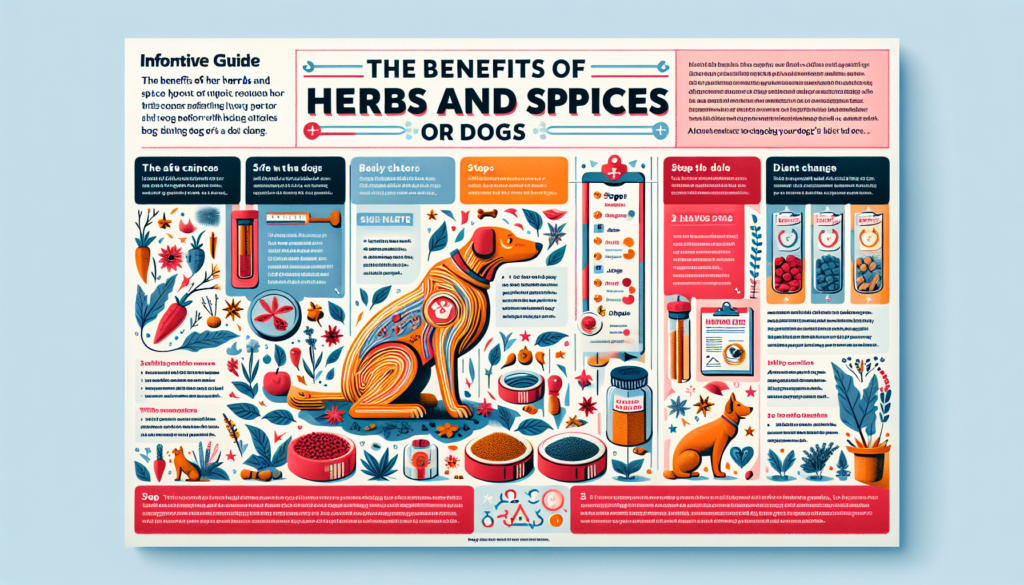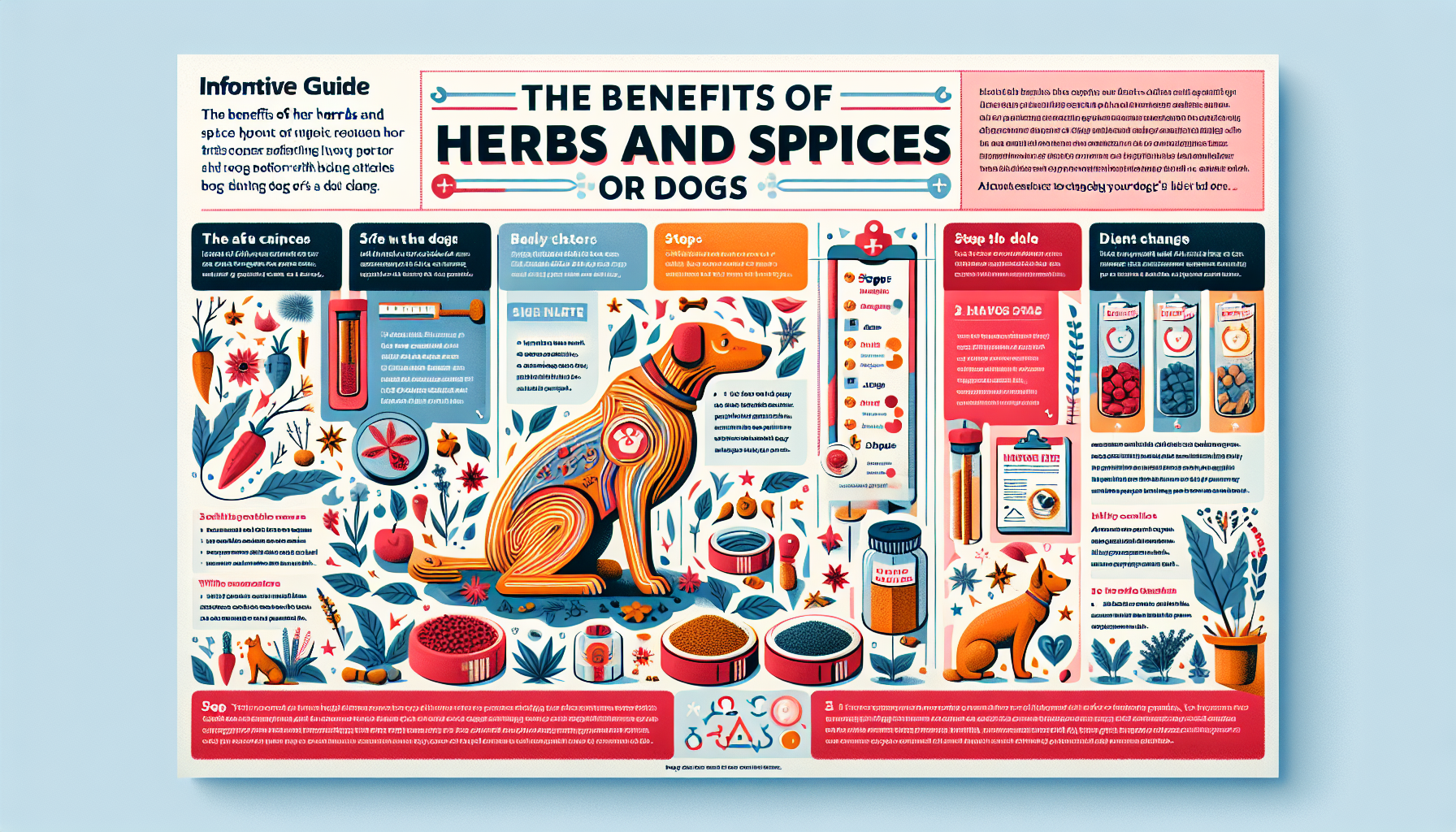If you’ve ever wondered how to add some flavor and variety to your furry friend’s diet, look no further than the world of herbs and spices. Incorporating herbs and spices into your dog’s meals can not only enhance the taste but also provide numerous health benefits. From turmeric’s anti-inflammatory properties to parsley’s breath-freshening abilities, there are plenty of options to explore. In this article, we will dive into the topic of incorporating herbs and spices into your dog’s diet, providing you with a list of safe and beneficial options to consider. So, let’s spice things up and discover how to unleash the potential of herbs and spices in your beloved pup’s meals!
Incorporating Herbs and Spices into Your Dog’s Diet
Introduction to Incorporating Herbs and Spices into Your Dog’s Diet
When it comes to taking care of our furry friends, providing them with a nutritious, balanced diet is essential. While commercial dog food is formulated to meet their dietary needs, incorporating herbs and spices into their meals can offer additional health benefits. Just like humans, dogs can benefit from the natural goodness that herbs and spices provide. In this article, we will explore the benefits of herbs and spices for dogs, important considerations before introducing them, as well as a list of safe and beneficial herbs for your beloved furry companion.
Benefits of Herbs and Spices for Dogs
Adding herbs and spices to your dog’s diet can have numerous positive effects on their overall health. Many herbs and spices contain powerful antioxidants, anti-inflammatory properties, and essential vitamins and minerals that can help support their immune system, aid in digestion, promote healthy skin and coat, and even alleviate certain health conditions. While it’s important to remember that herbs and spices should not replace a balanced diet, incorporating them can be an excellent way to enhance their meals and provide them with an extra nutritional boost.
Considerations Before Introducing Herbs and Spices
Before you start adding herbs and spices to your dog’s diet, it’s important to consider a few factors. First and foremost, consult with your veterinarian. They will be able to provide guidance on which herbs and spices are safe for your specific dog and any potential interactions with medications they may be taking. Additionally, it’s crucial to introduce new ingredients gradually, observing your dog’s reaction to ensure they tolerate them well. Lastly, be mindful of the quantity you add to their meals, as too much of certain herbs or spices can have adverse effects.
Safe Herbs for Dogs
While there are numerous herbs and spices that can be safely incorporated into your dog’s diet, we will highlight ten of the most commonly used and beneficial ones:

1. Parsley
Parsley is not only a flavorful herb, but it is also packed with essential vitamins A, C, and K, as well as important minerals like iron and potassium. This herb can help freshen your dog’s breath while supporting their immune system and promoting healthy digestion.
2. Basil
Basil is a fragrant herb that adds a burst of flavor to meals. It contains antioxidants and has anti-inflammatory properties, which can help reduce inflammation and support overall wellbeing in dogs.
3. Turmeric
Turmeric has gained popularity in recent years due to its potent anti-inflammatory effects. It contains an active compound called curcumin, which can help alleviate joint pain, promote a healthy coat, and even support brain health in dogs.
4. Cinnamon
Cinnamon is a warming spice that not only adds a delightful aroma to dishes but also offers several health benefits for dogs. It has antioxidant properties that can help support their immune system, regulate blood sugar levels, and even aid in reducing inflammation.

5. Ginger
Ginger is known for its ability to soothe upset stomachs and aid in digestion. It can also help alleviate nausea, making it an excellent option for dogs with motion sickness or those experiencing gastrointestinal discomfort.
6. Thyme
Thyme is a flavorful herb that contains essential oils with antimicrobial properties. It can help fight off harmful bacteria and improve your dog’s oral health. Additionally, thyme is a good source of vitamin C, promoting a strong immune system.
7. Rosemary
Rosemary not only adds a delicious aroma to meals but also has several health benefits for dogs. It has antioxidant properties, supports digestion, and may even help improve memory function in older dogs.
8. Dandelion
Dandelion is a herb known for its diuretic properties. It can help support kidney function and flush out toxins from your dog’s body. Additionally, dandelion contains vitamins A, C, and K, as well as important minerals like calcium and iron.
9. Peppermint
Peppermint is a cooling herb that can aid in digestion, alleviate gas and bloating, and even freshen your dog’s breath. It also contains properties that may help repel certain pests like fleas and ticks.
10. Sage
Sage is a versatile herb that is known for its antimicrobial properties. It can help fight off harmful bacteria and support oral health. Additionally, sage contains vitamins A and K, which contribute to overall wellbeing.
Preparing and Serving Herbs and Spices for Dogs
When preparing herbs and spices for your dog, it’s important to use them in their natural form, avoiding any additives or preservatives. Fresh herbs are generally the best option, but if fresh is not available, organic dried herbs can also be used. To incorporate them into your dog’s meals, you can finely chop the herbs and sprinkle them over their food or mix them with a small amount of water and drizzle it on top. Remember to start with small quantities and gradually increase as you monitor your dog’s response.
Conclusion
Incorporating herbs and spices into your dog’s diet can provide various health benefits and enhance their overall well-being. From parsley and basil to turmeric and cinnamon, the world of herbs and spices offers a wide array of flavors and nutrients for your four-legged friend. However, it’s important to remember that while herbs and spices can be beneficial, they should not replace a balanced diet and proper veterinary care. Always consult with your veterinarian before introducing any new ingredients to ensure they are safe for your dog’s individual needs. With their guidance and careful consideration, you can spice up your dog’s meals and contribute to their overall health and happiness.





